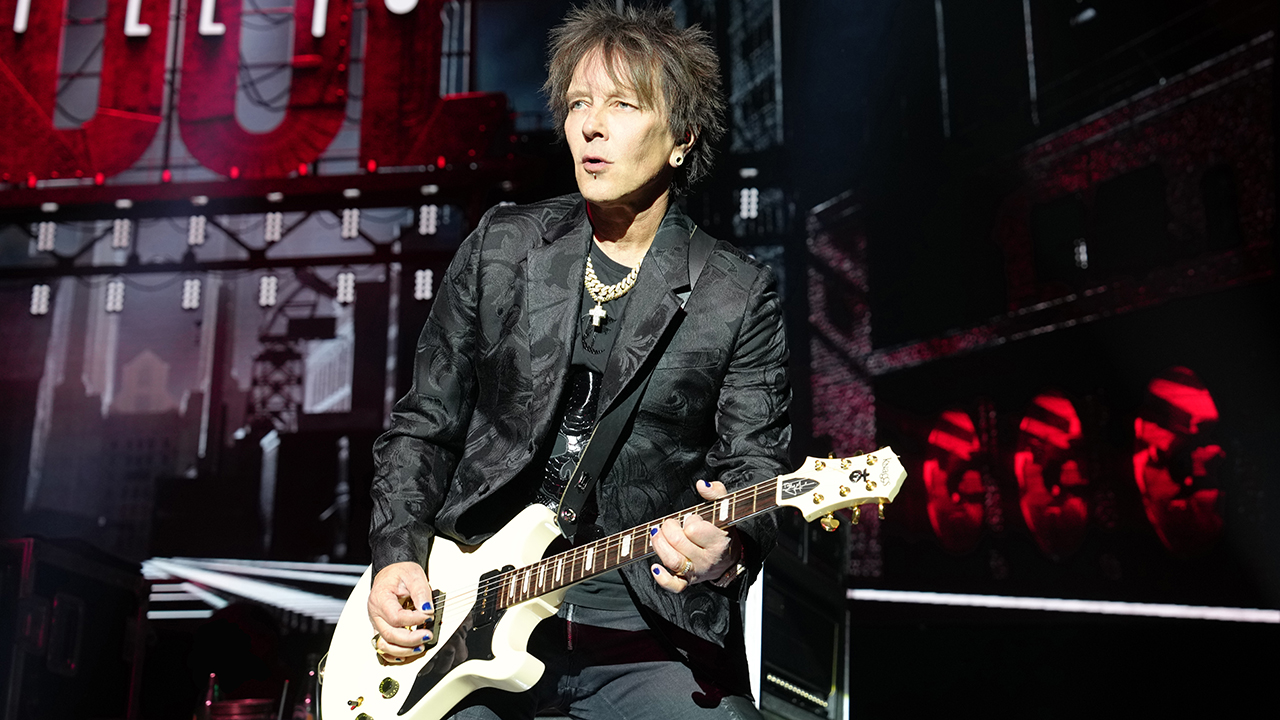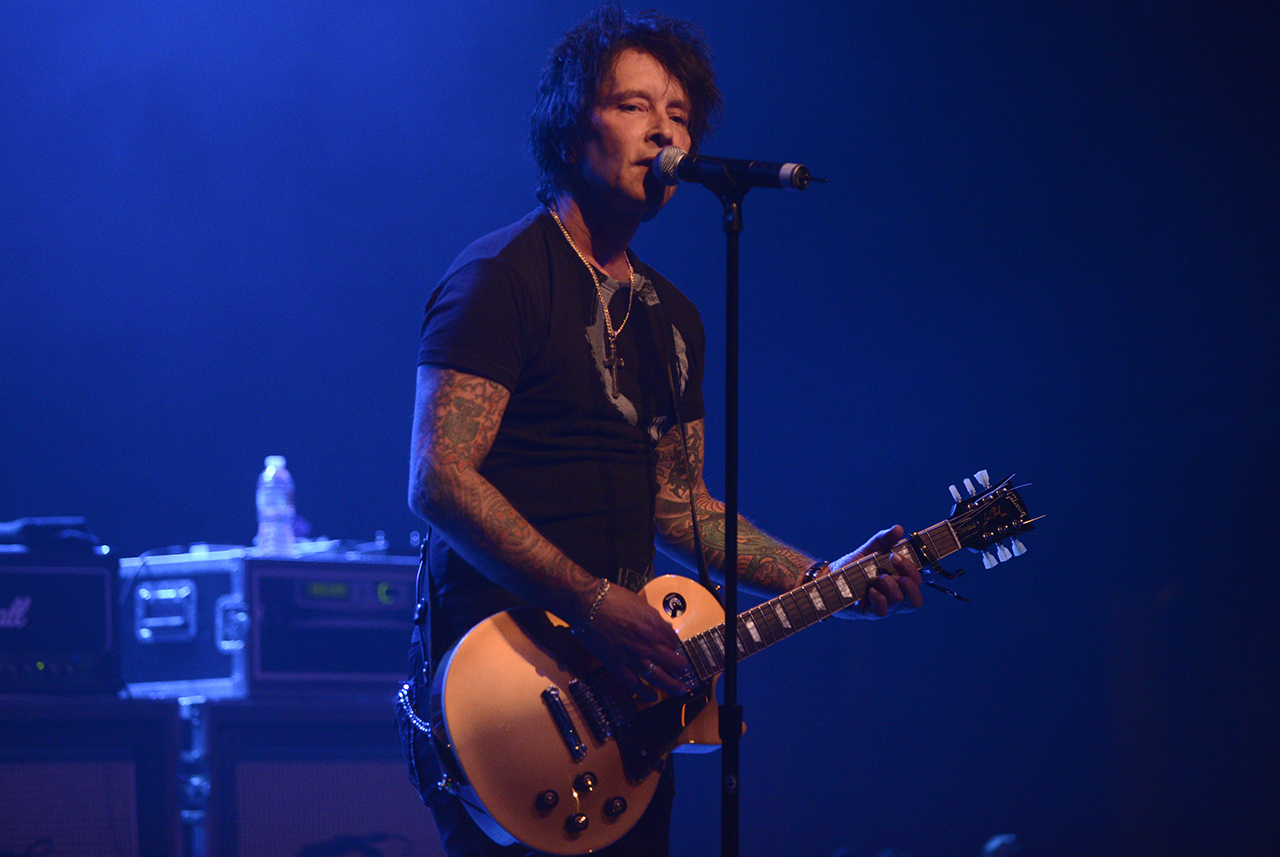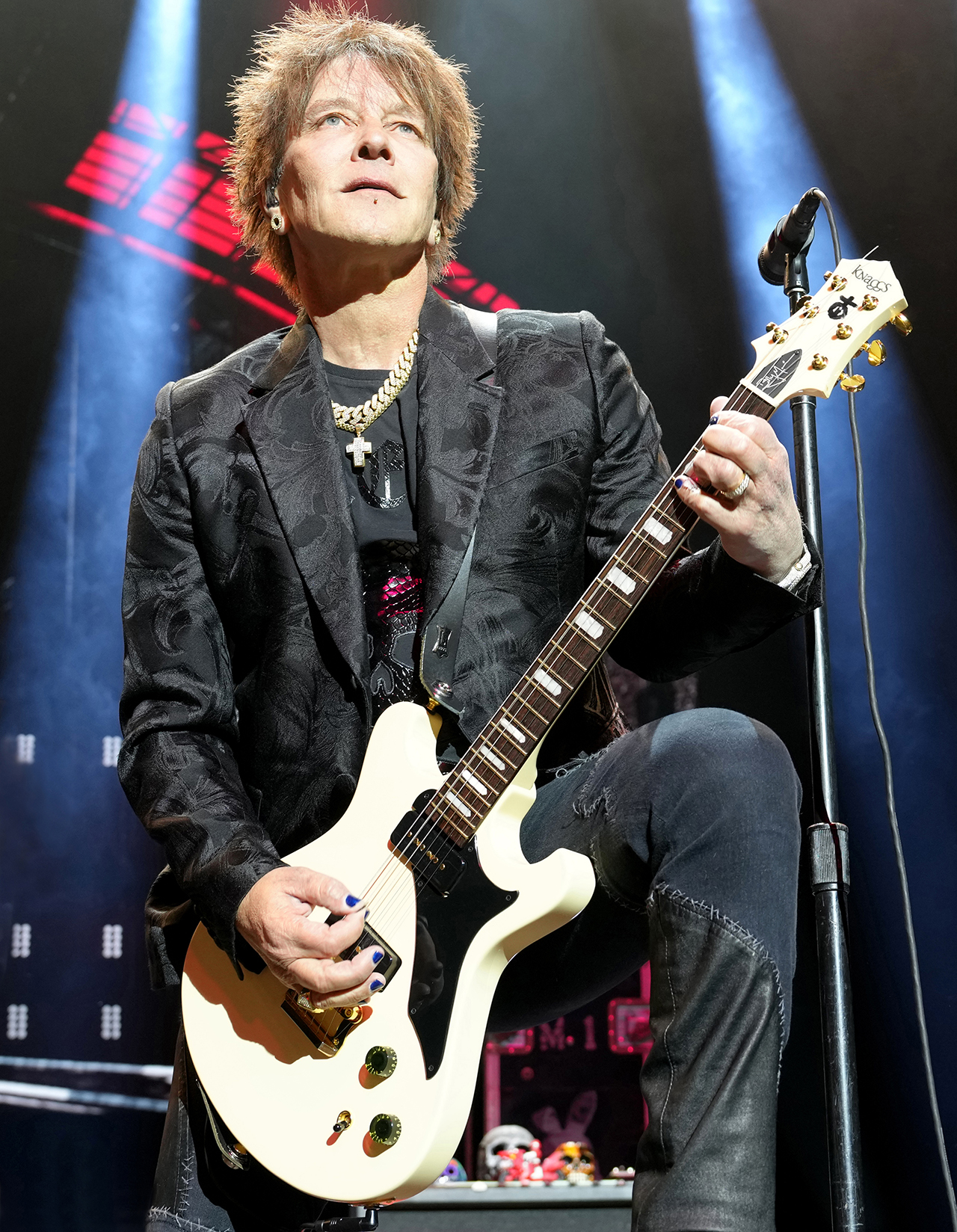“I had a ridiculously long, complex chord and key change solo section. And who comes to mind? Steve Vai!” How Billy Morrison assembled a guitar lineup that includes John 5, Steve Stevens and Steve Vai for his triumphant comeback solo album
Inspired by a basic signal chain and the “simplest guitar album on the planet”, Billy Idol’s right-hand man feels vindicated with the unplanned success of The Morrison Project

Billy Morrison has a 15-year tenure with Billy Idol under his leather-clad belt. Across his career, the former Cult member has also become close with fellow guitarists Steve Vai, John 5 and Steven Stevens. That means, not only has he kept good company, he’s dropped some damn good tunes along the way.
However, when he released new solo record The Morrison Project, it had been nine years since his previous outing, God Shaped Hole. That’s forever in the music business – so the idea that he’d drag in over two million streams and see lead single Crack Cocaine race up the charts was a wild one.
But then, Morrison wasn’t planning on making a record, and not much planning went into the single, which was co-written by Steve Stevens and features Ozzy Osbourne. “That’s one of those moments in time that you don’t get very often,” Morrison tells Guitar World.
“It’s very weird for me because my career has been about playing guitar for the guy whose name is on the marquee. I’m fine with that; I'm a solid rhythm player, and I like my position in the world. But to wake up and see I have a hit song… it’s very weird.”
The album features punk rock flourishes throughout, and even a straight-up hip-hop offering in Just Like a Movie. “When hip-hop came out in the ‘80s, the world had such an overreaction, and I loved that,” he says. “I believe music is a way of voicing frustration and anger. When I heard the first N.W.A. album [Straight Outta Compton], I was like, ‘This is the angriest record I’ve ever heard – and I absolutely relate.’”
What kicked off The Morrison Project?
“It’s actually very interesting – I didn’t know I was making a record. I think that’s why it’s so eclectic and has been so well received. The whole thing started during Covid, when, like most creatives, I was locked up in my house for a couple of years.
All the latest guitar news, interviews, lessons, reviews, deals and more, direct to your inbox!
“So I was just messing around, making clips of music with different vibes and genres. I wasn’t thinking about a cohesive set of songs. One day there’d be a hip-hop beat, and the next I’d write a metal guitar riff.
“Then Sharon Osbourne said, ‘You know that song you've got with Ozzy? That’s an amazing song. You should release it.’ I went back to the music I’d made, because I didn’t want to put just one song out. I felt like rather than saying, ‘Here's a song with Ozzy on it that I wrote with Steve Stevens,’ I should say, ‘Here’s an album from the Covid sessions.”
Was there a song that made you feel you were really rolling, in terms of the record’s vibe?
“Absolutely. Not in so much as chasing sounds, because there’s a piano ballad, a hip-hip song, metal guitar and punk. But the one song that put the light bulb on in my head was Drowning. It’s the opening track.
“When I sang that it I was like, ‘Okay, I have a vibe. I have an emotion and a feeling.’ And off I went on my journey of information overload, angst, and anxiety – all those feelings that we had during Covid.”
People may have an idea of you as a rock guitarist and don’t realize you’re so deeply influenced by other things.
“That never really factors in for me, though. I was there when punk was formed – I have a legitimate claim there. I was in South London watching all those bands; I was there. And hip-hop is my second love. I absolutely listen to it all the time.
“Hip-hop, to me, is just punk rock. Punk rock was an attitude, not a haircut. When hip-hop hit, it was just another group of disenfranchised people going, ‘I don’t care what you think. This is our frustration with the world.’ It came out strong and aggressive – and that’s what punk rock was.”

So the sound of hip-hop isn’t really in your guitar playing, but like punk rock, there’s a strong connection with the attitude?
“Yeah… I have an unreleased track that will probably come out later this year with Cypress Hill. Cypress Hill and Run-DMC are my friends, but they wouldn’t let me do stuff with them unless it’s cool. So I have the endorsement of Run-DMC and Cypress Hill – that’s pretty strong.”
Did you immediately realize that hip-hop was for you, or did it take time for you to understand that it came from the same roots as punk?
“I’ve always been a fan of groove and beats. Back in England there were the Happy Mondays and the Stone Roses, who were using hip-hop grooves. But in the late ‘80s I heard N.W.A. for the first time – along with Ice-T, Eazy-E, and Dr. Dre – and it was the exact same overreaction as when the Sex Pistols came out: ‘Oh my God! How dare they! Our children!’”
None of the tracks were written with anyone in mind. I wasn’t thinking, ‘How many famous people can I get on this record?’
What gear did you use to shape your tone for the album?
“It’s a continuation of things I’ve used in the past, especially since I own a recording studio. I’m always buying more gear, but I always have a Marshall 200 [Marshall Major] modded by Dave Friedman. And I have a Friedman head, which runs through a switcher, and a load box. That’s my main sound, and has been for years.”
Since you had so many guests on The Morrison Project, is it safe to assume you played a lot of rhythm guitar?
“Yes, and one of my favorite things is layering guitars. Maybe there’s a thin, jangly sound I want, so I’ll go through my Line 6 POD, which is not renowned for its sonic quality. But for that type of sound I’ll get the tremolo on it and a tiny Vox AC-30 with a slightly distorted sound.”
Was it tough to decide what guitar parts to add to players like Steve Stevens and John 5?
“None of the tracks were written with anyone in mind. I wasn’t thinking, ‘How many famous people can I get on this record?’ I wanted to serve the songs. It became clear to me as I was working; I’d say, ‘You know who would be great on this one? John 5.’ And John is a friend; he’s in my phone, so I texted him and he said, ‘Yes!’
And you have Steve Vai on here, too.
“Yes! The point I’m making is that it was very organic. I didn’t ask any managers or agents – they’re all close friends I’ve worked with many times. It just so happened that I had a ridiculously long, complex chord and key change solo section. And who comes to mind when you think of that? Steve Vai!”
Along with Crack Cocaine and Drowning, another lowkey highlight here is Puppet on a String.
“Through doing the press for this album, it’s become clear that I do angry boy quite well! Drowning, Dystopia and Puppet on a String – those three songs describe that exactly. I just sat down with my thoughts… If I’d known I was making an album, it wouldn’t have come out as good.
“I was just venting. We were all sitting at home, watching TV, getting information every single minute. They would say, ‘It’s gonna last a month,’ and then it lasted two years. There were riots and a financial collapse; it had us all feeling these feelings. I’m just lucky I had a vehicle for my version of those feelings. It looks like everyone relates to my screaming and shouting.”

What also stands out is your tone – even though you have John 5, Steve Stevens, and Steve Vai at the forefront.
“The process is as simple as I can make it. There isn’t a huge pedalboard. I think what’s in my head as I record is, ‘Quality in equals quality out.’ The more processing you put on stuff, the worse it’s going to sound. I went to great pains to make sure the tone was perfect to my ears.”
Is there a particular gear-related secret to that?
“There isn’t a huge signal chain, really. One of the things I learned from [the Sex Pistols’] Never Mind the Bollocks – the simplest guitar album on the planet – is that the reason it sounds so good is the purity and honesty of the guitar tone.
I was able to write a Bowie-like piano ballad… and on the same album I’m screaming and shouting about the state of the world
“Jonesy [Steve Jones] knows a good tone when he hears it, and so do I. My recording technique is to make sure that, whatever’s going in, I don’t mess with it. I make sure it sounds fat and bold and fits in the EQ spectrum with everything else. You can’t go wrong.”
It seems like the album might be the best representation of you as an artist to date.
“The experience of being able to spread my wings has been nothing short of spectacular. I love David Bowie. I was able to write a Bowie-like piano ballad for Linda Perry to sing, Chasing Shadows, and on the same album, I’m screaming and shouting about the state of the world with Dystopia.”
Then there’s Just Like a Movie, the hip-hop cut with Run-D.M.C.
“Right – I got to hang with them in the studio and do a hip-hop song. It’s been spectacular. And above all, it’s been an honest experience; all the lyrics, the chords – everything on this record is very honest.
“If you don't think you’re making a record, what have you got to lose? I’m just lucky that when I put it all together, my label said, ‘This is a great record.’ And the vindication of watching Crack Cocaine go up the charts and the album hit two million streams… it’s been an amazing experience.”
- The Morrison Project is on sale now via TLG / Virgin.
Andrew Daly is an iced-coffee-addicted, oddball Telecaster-playing, alfredo pasta-loving journalist from Long Island, NY, who, in addition to being a contributing writer for Guitar World, scribes for Bass Player, Guitar Player, Guitarist, and MusicRadar. Andrew has interviewed favorites like Ace Frehley, Johnny Marr, Vito Bratta, Bruce Kulick, Joe Perry, Brad Whitford, Tom Morello, Rich Robinson, and Paul Stanley, while his all-time favorite (rhythm player), Keith Richards, continues to elude him.




![B.B. King [left] cups his hands to his ear as he asks the crowd for more. Joe Bonamassa, with a Les Paul, gives his crowd a thumbs up](https://cdn.mos.cms.futurecdn.net/P3XrQLh86C27JfPp4AGp6n.jpg)